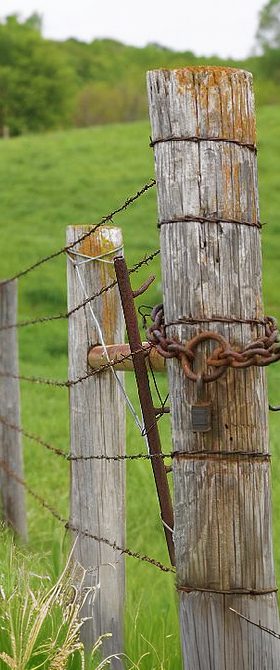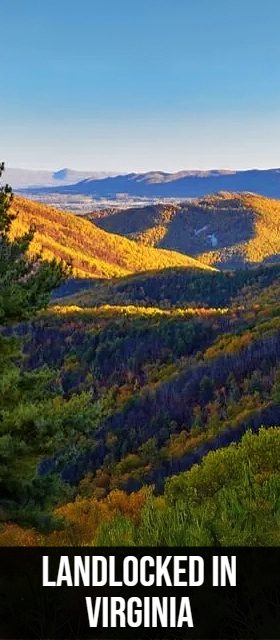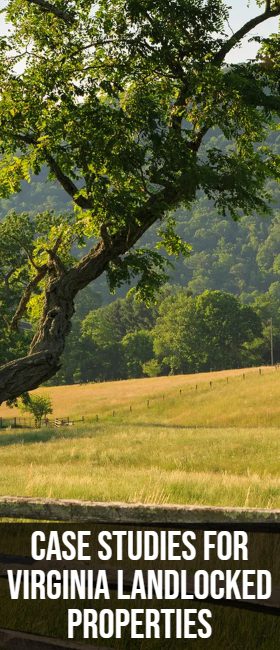
Ah, landlocked property—the term might make you think of a land parcel floating helplessly in a sea of restrictions, but don’t worry, it’s not as hopeless as it sounds. Landlocked property Virginia is essentially a piece of land that lacks direct access to a public road. This can make it tricky to reach, especially when you’re hauling in your latest shipment of farm-fresh tomatoes or that vintage tractor you’ve always wanted. But don’t let the lack of a driveway keep you from what could be a hidden gem. Virginia’s landlocked properties are full of potential; you just need to know how to unlock them.

Understanding Easements in Virginia
Navigating the world of easements might feel like trying to decipher an ancient map without a compass, but once you get the hang of it, these legal pathways can be the key to unlocking your landlocked property’s potential. Let’s break down the types of easements you might encounter in Virginia and how each can help you turn that isolated parcel into prime real estate.
Easement Appurtenant: Your Permanent Pathway
Imagine an easement appurtenant as the VIP pass of the land access world—it’s tied directly to your land and stays with it no matter who owns the property. This type of easement is a real estate powerhouse, giving your land (known as the dominant estate) a legal right to cross over another piece of land (the servient estate). The beauty of this setup is that it’s permanent. Sell your property? No worries—the new owner inherits this golden ticket, ensuring they won’t need to reinvent the wheel when it comes to access.
This kind of easement is particularly valuable if your landlocked property is nestled within an area that’s rapidly developing. As long as that easement exists, you’ll have a guaranteed way to reach your property, whether you’re planning to build, sell, or simply enjoy a weekend getaway.
Easement in Gross: A Personal Connection
Now, let’s talk about easement in gross—think of it as more of a personalized invitation than a land-bound right. Unlike easement appurtenant, which sticks to the land like glue, an easement in gross is connected to an individual or entity rather than a specific property. It’s like having a backstage pass to a concert, but instead of front-row seats, you get access to run utility lines or use someone’s property for a specific purpose.
These easements are common in situations where utility companies need to lay down power lines or pipelines, but they can also be used for more personal reasons, like accessing a favorite fishing spot on your neighbor’s land. The catch? If you sell your property, the easement doesn’t automatically transfer to the new owner—unless you’ve made specific arrangements.
Prescriptive Easement: Use It or Lose It
Prescriptive easements are the ultimate “finders keepers” of the easement world. If you’ve been using a path across someone else’s land for years—openly, continuously, and without their explicit permission—you might just earn the right to keep doing so legally. It’s a bit like claiming squatter’s rights, but for access.
This type of easement can be a game-changer if you’ve been accessing your landlocked property through someone else’s land for a long time without any objections. However, proving a prescriptive easement requires meeting specific legal criteria, so it’s often best to consult with an attorney who can guide you through the process.
Legal Considerations for Landlocked Property Owners
Owning a landlocked property in Virginia isn’t just about finding the land; it’s about understanding the legal landscape. Virginia’s easement laws offer a roadmap, but you’ll need to be prepared for a few twists and turns along the way.
Checking for Existing Easements
Before you start sketching out blueprints for your dream home or considering where to plant that orchard, take a good, hard look at the existing easements on your property. This isn’t the time to play hide and seek—hidden easements can turn your plans upside down if you’re not careful.
Start by digging through property records and conducting a title search. If you find an easement, understand its terms and conditions. Does it allow vehicle access, or is it limited to foot traffic? Can it accommodate heavy construction equipment, or will you need to make alternate arrangements? The answers to these questions can make or break your development plans.
Negotiating New Easements
If your land is as isolated as a desert island and there are no existing easements, it’s time to sharpen your negotiation skills. Sometimes, all it takes is a neighborly chat to secure the access you need. But if friendly negotiations don’t pan out, don’t hesitate to bring in a property attorney. They can help you navigate the legal complexities and potentially secure a court-ordered easement if necessary.
Remember, it’s not just about getting access—it’s about getting the right kind of access. Make sure any new easements are legally sound, clearly defined, and documented to avoid future disputes.
How to Gain Access to a Landlocked Property in Virginia
So you’ve got your eye on a charming piece of Virginia real estate, but there’s one big catch: it’s landlocked. Don’t worry, there are several ways to legally access your property, and with a little perseverance, you’ll be able to turn that obstacle into an opportunity.
Hiring a Property Attorney: Your Legal Guide
Navigating property law can be as tricky as finding your way through a dense forest at night. That’s where a property attorney comes in. They’ll be your guide, helping you discover any hidden easements or negotiate new ones. A good attorney will have experience with landlocked properties and can help you understand your options, from court-ordered easements to friendly negotiations with neighbors.
Working with Local Authorities: Uncovering Hidden Gems
Local authorities can be an invaluable resource when you’re trying to gain access to a landlocked property. They often hold records of old easements or public right-of-ways that might not be immediately obvious. A trip to the local courthouse or a chat with the planning department could reveal that your land isn’t as isolated as it seems.
Negotiating with Neighbors: A Little Sugar Goes a Long Way
If all else fails, a little goodwill can go a long way. Approaching your neighbors with a smile and a proposition might be all it takes to secure an easement. After all, access issues are often easier to resolve with cooperation than confrontation.
Offering something in return, like a shared maintenance agreement for a new road, can sweeten the deal. And if you’re really in a pinch, don’t underestimate the power of homemade cookies—neighborly gestures can sometimes pave the way for smoother negotiations.

Is Buying Landlocked Property in Virginia a Good Investment?
So, you’ve found a landlocked property at a price that seems too good to be true. The big question: Is it worth the investment? The answer depends on your risk tolerance and willingness to roll up your sleeves.
The Pros: Hidden Gems at a Discount
One of the biggest perks of buying landlocked property is the price. These parcels are often sold at a discount because of their access issues. If you can secure an easement, you’ve turned that discount into instant equity. Plus, landlocked properties are often located in quiet, scenic areas, making them ideal for those seeking a peaceful retreat or a long-term investment.
The Cons: The Devil’s in the Details
On the flip side, landlocked properties come with their fair share of challenges. Securing access can be a time-consuming and costly process, and there’s no guarantee of success. You might find yourself in a legal battle or facing uncooperative neighbors. And even if you secure access, you’ll need to weigh the cost of improvements, like building a road, against the potential return on investment.
Doing Your Homework: The Key to Success
The key to making a smart investment is doing your homework. Research the property thoroughly, consult with experts, and consider the long-term potential. If the benefits outweigh the challenges, a landlocked property can be a diamond in the rough, waiting to be polished.
Case Studies of Landlocked Properties in Virginia

Real-life examples can provide valuable insights into what it’s like to deal with landlocked property. Let’s take a look at how a few savvy investors turned their isolated parcels into profitable ventures.
Fairfax County: The Auction Win
In Fairfax County, an investor snagged a landlocked parcel at auction for a fraction of its value. With the help of a local attorney, they uncovered an old easement buried in the county records. This easement provided the access needed to develop the property, transforming it from an isolated lot into a prime piece of real estate.
Loudoun County: The Prescriptive Easement Success
Over in Loudoun County, a rural estate had been landlocked for decades. The new owner worked tirelessly with local authorities and neighboring landowners to establish a prescriptive easement. This legal right to access, earned through years of use, significantly increased the property’s value and marketability.
Albemarle County: The Historical Estate
In Albemarle County, a historical estate was landlocked and seemed destined to remain that way. However, after months of negotiations and legal wrangling, the new owner secured a permanent easement. This opened the door for the estate to be transformed into a luxurious retreat, which was later sold for a hefty profit.
These case studies highlight the potential rewards—and risks—of investing in landlocked property. With the right strategy and a bit of persistence, what seems like a roadblock can turn into a profitable opportunity.
Conclusion: Owning Landlocked Property in Virginia
Owning landlocked property in Virginia is not for everyone, but for those up to the challenge, it can be immensely rewarding. Whether you’re drawn by the lower cost or the thrill of unlocking its potential, success hinges on a strong understanding of Virginia’s easement laws and a solid partnership with a property attorney.
With the right strategy and a bit of persistence, you could turn a landlocked parcel into a standout investment. What starts as a challenging project could become a valuable asset in your portfolio. Embrace the challenge, get the right guidance, and you might just uncover a hidden gem that outshines all others in your real estate ventures.
Frequently Asked Questions (FAQs)

1. What Is a Landlocked Property in Virginia?
A landlocked property is a parcel of land that does not have legal access to a public road. In Virginia, this often occurs due to historical property divisions, where land was subdivided without planning for public access, or when a property owner sells portions of land but retains the access points.
2. How Can I Gain Legal Access to My Landlocked Property Virginia?
Legal access can be obtained through easements. You may discover an existing easement by conducting a title search or working with a property attorney. If no easement exists, you can negotiate with neighboring landowners or seek a court-ordered easement through legal action.
3. What Types of Easements Are Available for Landlocked Properties in Virginia?
In Virginia, common easements include:
- Easement Appurtenant: Tied to the land and passed on with property ownership.
- Easement in Gross: Attached to an individual or entity rather than the land.
- Prescriptive Easement: Established through continuous, open use over a period without the owner’s objection.
4. Is It Possible to Sell a Landlocked Property in Virginia?
Yes, you can sell a landlocked property, but it may be challenging without legal access. Securing an easement or providing a clear pathway to resolving access issues can significantly increase the property’s marketability and value.
5. What Risks are Associated with Buying Landlocked Property in Virginia?
Risks include the potential difficulty and expense of securing legal access, possible legal disputes with neighbors, and the uncertainty of whether access will be granted. However, these properties often come at a lower purchase price, which can be a worthwhile trade-off if access is eventually secured.